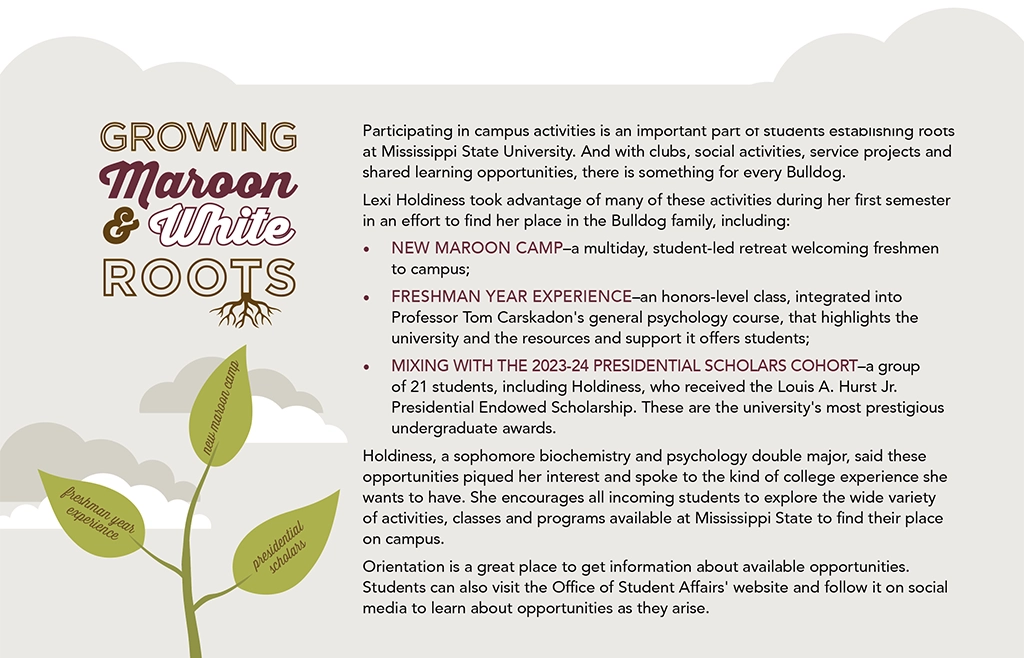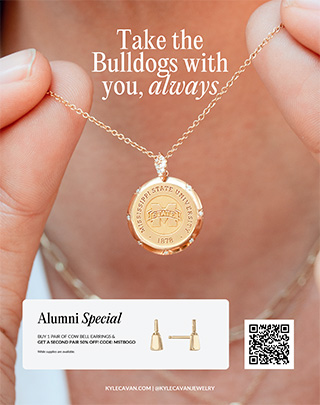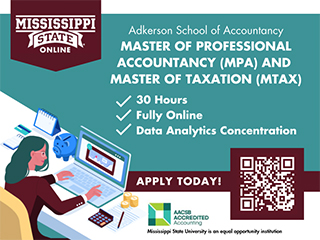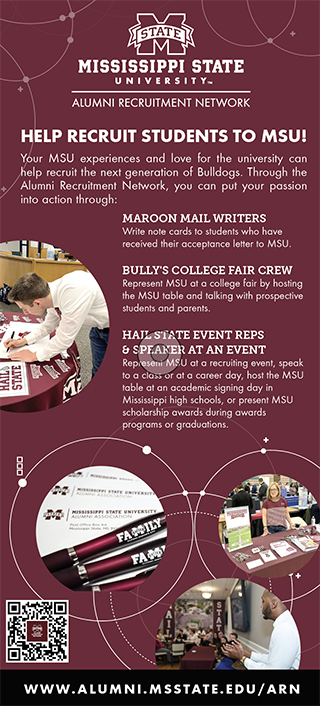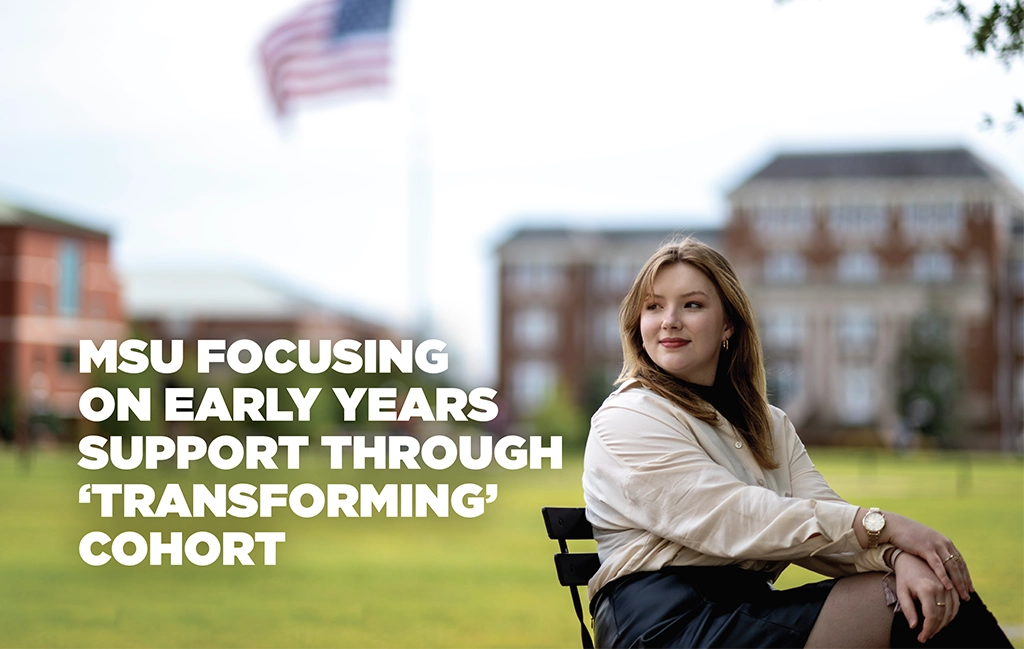
Lexi Holdiness says she didn’t feel like she became a Bulldog until she moved onto Mississippi State’s Starkville campus.
An honors graduate from the Mississippi School for Mathematics and Science, Holdiness chose MSU from a myriad of educational opportunities available. Still, despite being eager to become a Bulldog, the Meridian native says she felt like an outsider—until she came to campus in fall 2023.
Once she began her MSU journey, Holdiness says she quickly felt at home and was welcomed into the Bulldog family with open arms.
During her first semester, Holdiness took part in a variety of programs and experiences aimed at immersing new students in the history, culture and workings of all things Maroon and White.
“It’s easy to feel alone when you first come to a new place,” Holdiness said. “You think you’re just a name on a sheet of paper, and you don’t know anyone. Mississippi State, however, made me feel like they had my name highlighted. They knew exactly who I was and what I wanted to do.
“Everyone, especially my Shackouls Honors College professors and mentors, has made me feel completely at home and part of the family,” she added. “The feeling of being seen made my super-challenging classes less daunting because I felt less alone.”
Increasing student success through holistic support is paramount to MSU, and the university is focusing its efforts on building both community and academic opportunities—especially for freshmen and sophomores—as part of the Transforming the Foundational Postsecondary Experience cohort.
MSU, along with 10 other universities, is partnering with the Gardner Institute, a leading national, student success nonprofit organization, to analyze and transform the experiences of students during their first two years in college—the most important period of time in which young learners establish foundations for success in both academic and social settings.
Over the next five years, MSU will develop innovative strategies to enhance teaching and learning practices, and promote student success and retention.
“Instead of expecting students to be college-ready, we have to shift our mindset so that Mississippi State is student-ready,” said Regina Hyatt, vice president for student affairs. “We have to provide an environment in which students can flourish.
“Students have to feel like they’re members of a community—that they’re part of something happening, comfortable with their peers and that people care about them,” she continued. “They need to be able to look around and see peers who look like them or come from similar backgrounds and experiences, and they need to have a sense of belonging in the classroom, with faculty really setting high expectations and giving positive feedback about their progress. If they don’t feel these things, they’re going to retreat. Students have to see a clear connection to why they’re here and working so hard to get a degree.”
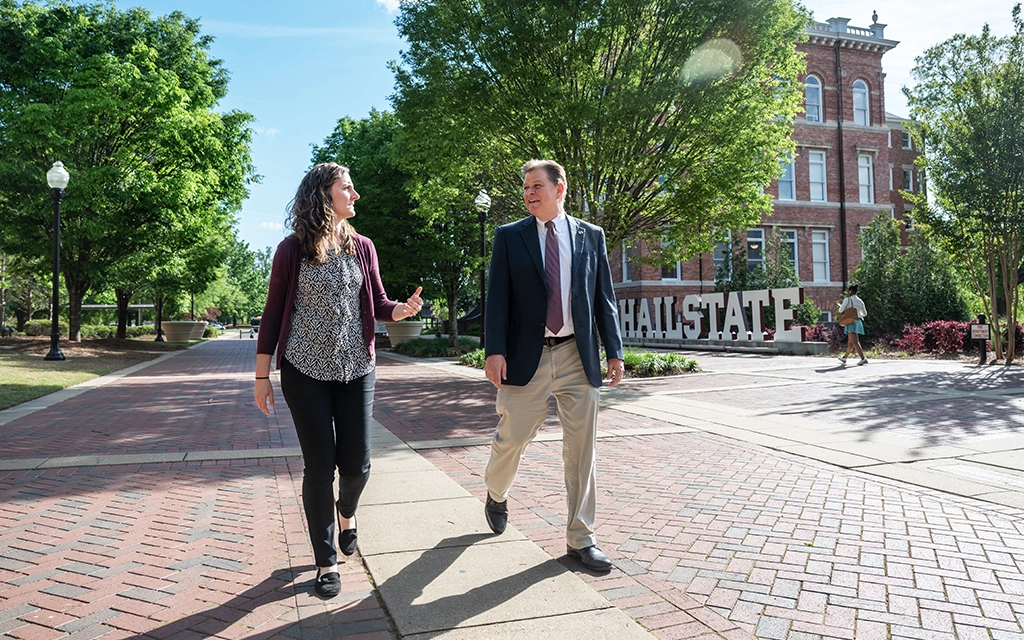
Currently, MSU is in the “sense-making phase” of the initiative, working to identify strengths and weaknesses in terms of student support and where opportunities exist to build better individual relationships, said Eric Moyen, assistant vice president for student success.
“In higher education, we get tripped up with student success by focusing on the numbers. We talk about retention, persistence and graduation rates—those are metrics, not student success,” Moyen said. “If we focus on creating active learners who have a sense of belonging and engagement, the numbers will take care of themselves.
“We’re looking at everything,” he continued. “Academically, we’re looking at how we design classes and the ways to get students the academic foundation they need. We’re taking a serious look at the support students need along the way, including tutoring and supplemental instruction opportunities through the MSU Center for Academic Excellence. Our goal is to get students to experience success in challenging courses without lowering the bar. We’re saying, ‘Mississippi State takes ownership in your success. We’re going to give you the tools to be successful.’”
To further support freshmen, the MSU Center for Advising is piloting a program that executive director Sawyer Bowering describes as “proactive, hands-on, individualized advising.” Eight student success coordinators serve students across MSU’s colleges to help them with not only traditional advising but also navigating situations they’ve never experienced outside their home.
“Advising freshmen is completely different from advising others. We’re looking at things like how to save a Word document as a PDF or getting enough rest so your brain has the energy it needs the next day,” she said. “Incoming freshmen have grown up with their home support system, and that’s all they know. They’re doing things they’ve never done before and haven’t developed problem-solving skills as they relate to college and life on their own.
“This relationship-building approach helps create successful students, and you have to be intentional with that approach,” Bowering added.
To truly take care of what matters, Moyen said MSU has to look beyond simply awarding degrees and focus on creating good citizens and stewards of society.
“The ultimate goal for students is to get a degree, but what that means to me is they were successfully able to navigate all aspects of college life—they were able to learn, think critically and be able to change their lives and make a positive impact on others. That is student success, and that’s where our hearts and minds are.”
By Carl Smith, Photos by Jonah Holland
